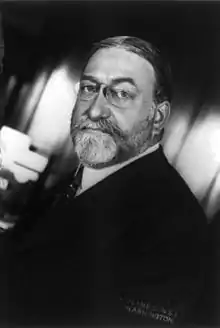John Bassett Moore
John Bassett Moore (December 3, 1860 – November 12, 1947) was an American lawyer and authority on international law.[1][2] Moore was a State Department official, a professor at Columbia University, and a judge of the Permanent Court of International Justice from 1921 to 1938, the first American judge to sit on that judicial body.[2]
John Bassett Moore | |
|---|---|
 | |
| 23rd United States Assistant Secretary of State | |
| In office April 27, 1898 – September 6, 1898 | |
| Preceded by | William R. Day |
| Succeeded by | David J. Hill |
| Personal details | |
| Born | December 3, 1860 Smyrna, Delaware |
| Died | November 12, 1947 (aged 86) |
| Political party | Republican |
| Profession | Politician, Author, Lawyer, Professor |
Biography
Moore graduated from the University of Virginia and was admitted to the Delaware bar in 1883. He practiced law in Wilmington, Delaware, before working as a law clerk at the Department of State from 1885 to 1886. He was an Third Assistant Secretary of State from 1886 to 1891, when he became Hamilton Fish Professorship of International Law and Diplomacy at Columbia Law School, the first chair of international law in the United States. Moore remained a Columbia professor until 1924, taking frequent leaves of absence to take up U.S. diplomatic posts.[2]
Moore briefly was Assistant Secretary of State in 1898.[2]
During his service with the Department of State he acted as secretary to the Conference on Samoan Affairs (1887) and to the Fisheries Conference (1887–1888).
After the close of the war with Spain was secretary and council to the American Peace Commission at Paris. In 1901, he served as professor of International Law at the Naval War College, where he initiated that college's long series of "International Law Blue Book" publications. Subsequently, Moore represented the government as agent before the United States and Dominican Arbitration Tribunal (1904), as delegate to the Fourth International American Conference at Buenos Aires and special plenipotentiary to the Chilean centenary (both 1910), and as delegate to the International Commission of Jurists at Rio de Janeiro (1912).
He was on the Hague Tribunal from 1912 to 1938, and was a judge of the Permanent Court of International Justice from 1920 to 1928.
Moore was a proponent of neutrality, believing that the post-World War I system of alliances would tend to broaden wars into global conflicts. He was also a strong believer in the principle of separation of powers under the United States Constitution, asserting in 1921, "There can hardly be room for doubt that the framers of the constitution, when they vested in Congress the power to declare war, never imagined that they were leaving it to the executive to use the military and naval forces of the United States all over the world for the purpose of actually coercing other nations, occupying their territory, and killing their soldiers and citizens, all according to his own notions of the fitness of things, as long as he refrained from calling his action war or persisted in calling it peace."[3]
Legacy

Moore was honored on a U.S. definitive postage stamp issued December 3, 1966, the five-dollar value of the Prominent Americans series.
In 1922, a new school was dedicated to Moore in his hometown of Smyrna, Delaware. The John Bassett Moore Intermediate School now serves as a public school for the fifth and sixth grades.
Moore is buried in Woodlawn Cemetery in New York City.
Works
- Reports on Extraterritorial Crime (1887)
- Extradition and Interstate Rendition (two volumes, 1891)
- American Notes on the Conflict of Laws (1896)
- History and Digest of International Arbitrations (6 vols., 1898)
- American Diplomacy (1905)
- Digest of International Law (8 vols., 1906)
- Works of James Buchanan (12 vols., 1909–1911, reissued 1960)
- Four Phases of American Development (1912)
- International Law and Some Current Illusions (1924)
- The Permanent Court of International Justice (1924)
- International Adjudications, Ancient and Modern (8 vols., 1937)
- Collected Papers (7 vols., 1945)
References
- Robert F. Turnera, War and the Forgotten Executive Power Clause of the Constitution: A Review Essay of John Hart Ely's War and Responsibility, 34 Va. J. Int'l L. 903, 916 (1994): "Arguably the greatest American international lawyer of this century, the late John Bassett Moore..."
- Christine E. White, http://www.judicialmonitor.org/archive_summer2009/leadingfigures.html Leading Figures in International Law: John Bassett Moore], International Judicial Monitor (Summer 2009).
- Proceedings of the American Philosophical Society. 60. Philadelphia, PA: American Philosophical Society. 1921. p. xvii. ISBN 978-1-4223-7249-4.
| Wikimedia Commons has media related to John Bassett Moore. |
Sister projects
![]() Works related to John Bassett Moore at Wikisource
Works related to John Bassett Moore at Wikisource
Further reading
![]() This article incorporates text from a publication now in the public domain: Gilman, D. C.; Peck, H. T.; Colby, F. M., eds. (1905). "Moore, John Basset". New International Encyclopedia (1st ed.). New York: Dodd, Mead.
This article incorporates text from a publication now in the public domain: Gilman, D. C.; Peck, H. T.; Colby, F. M., eds. (1905). "Moore, John Basset". New International Encyclopedia (1st ed.). New York: Dodd, Mead.
External links
| Government offices | ||
|---|---|---|
| Preceded by Alvey A. Adee |
Third Assistant Secretary of State August 6, 1886 – September 30, 1891 |
Succeeded by William Morton Grinnell |
| Preceded by William R. Day |
United States Assistant Secretary of State April 27, 1898 – September 6, 1898 |
Succeeded by David J. Hill |